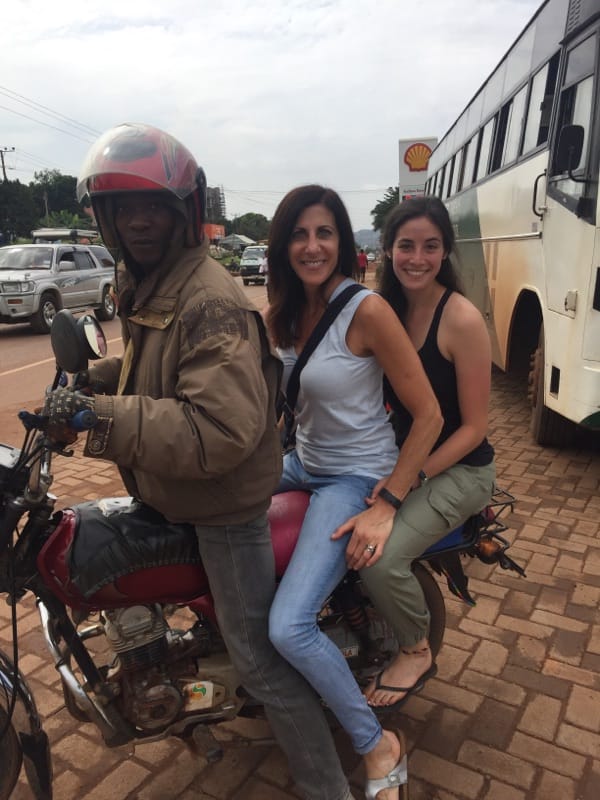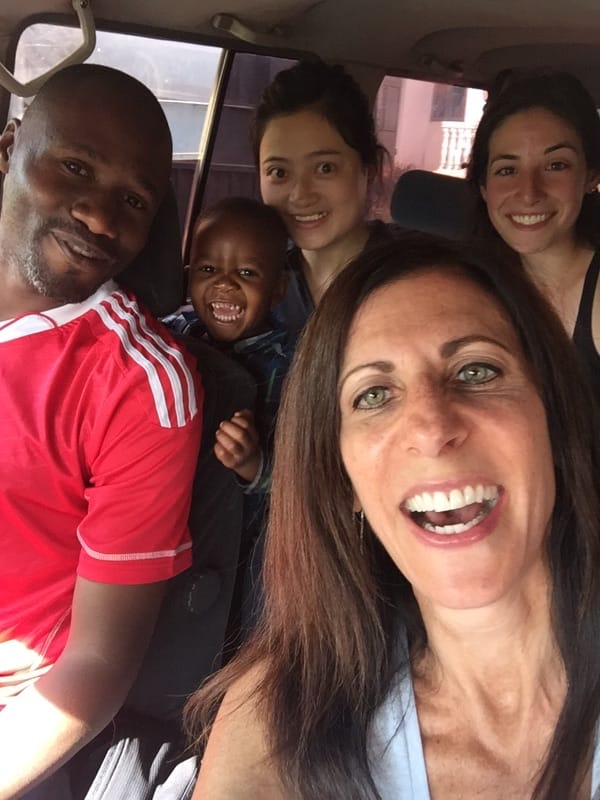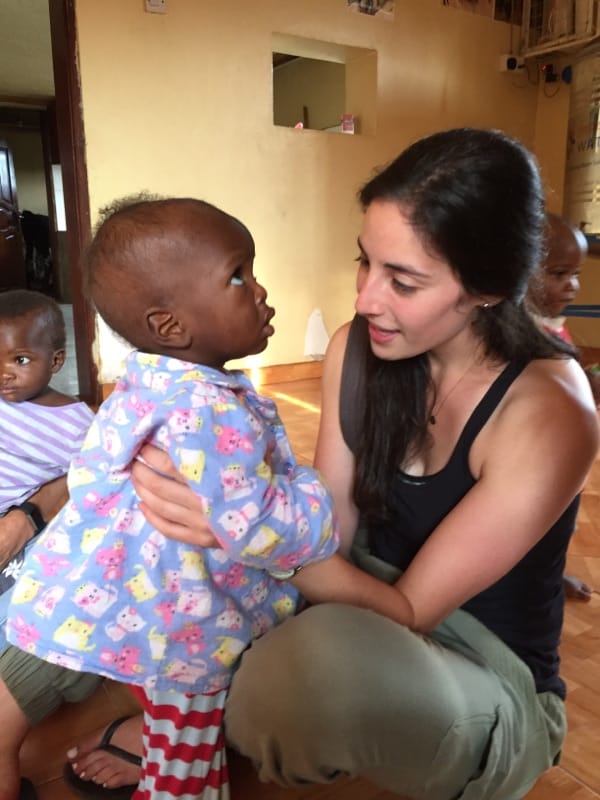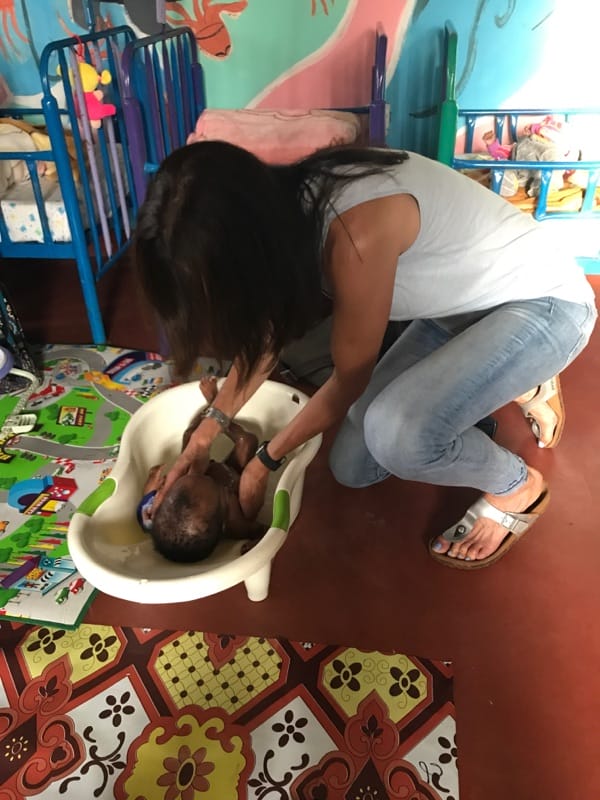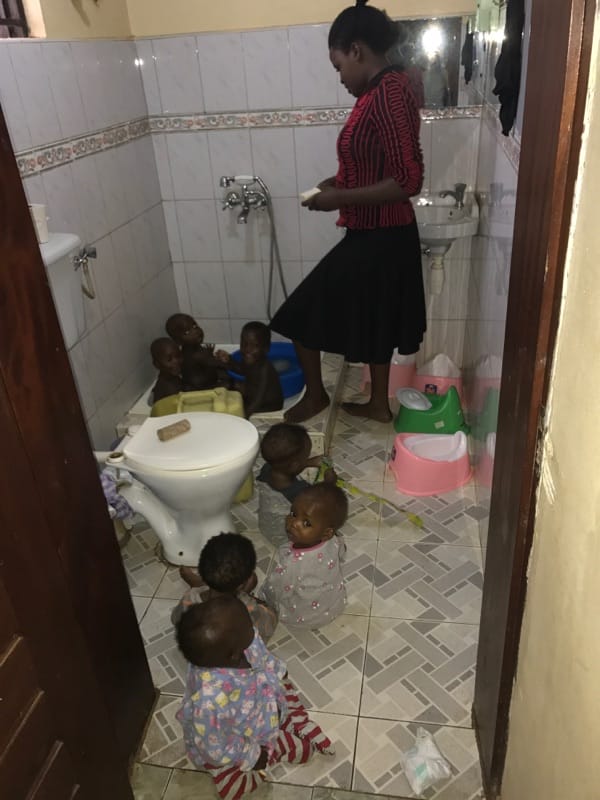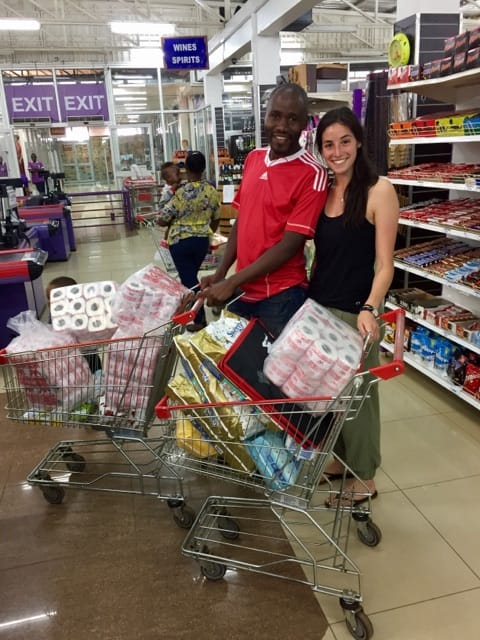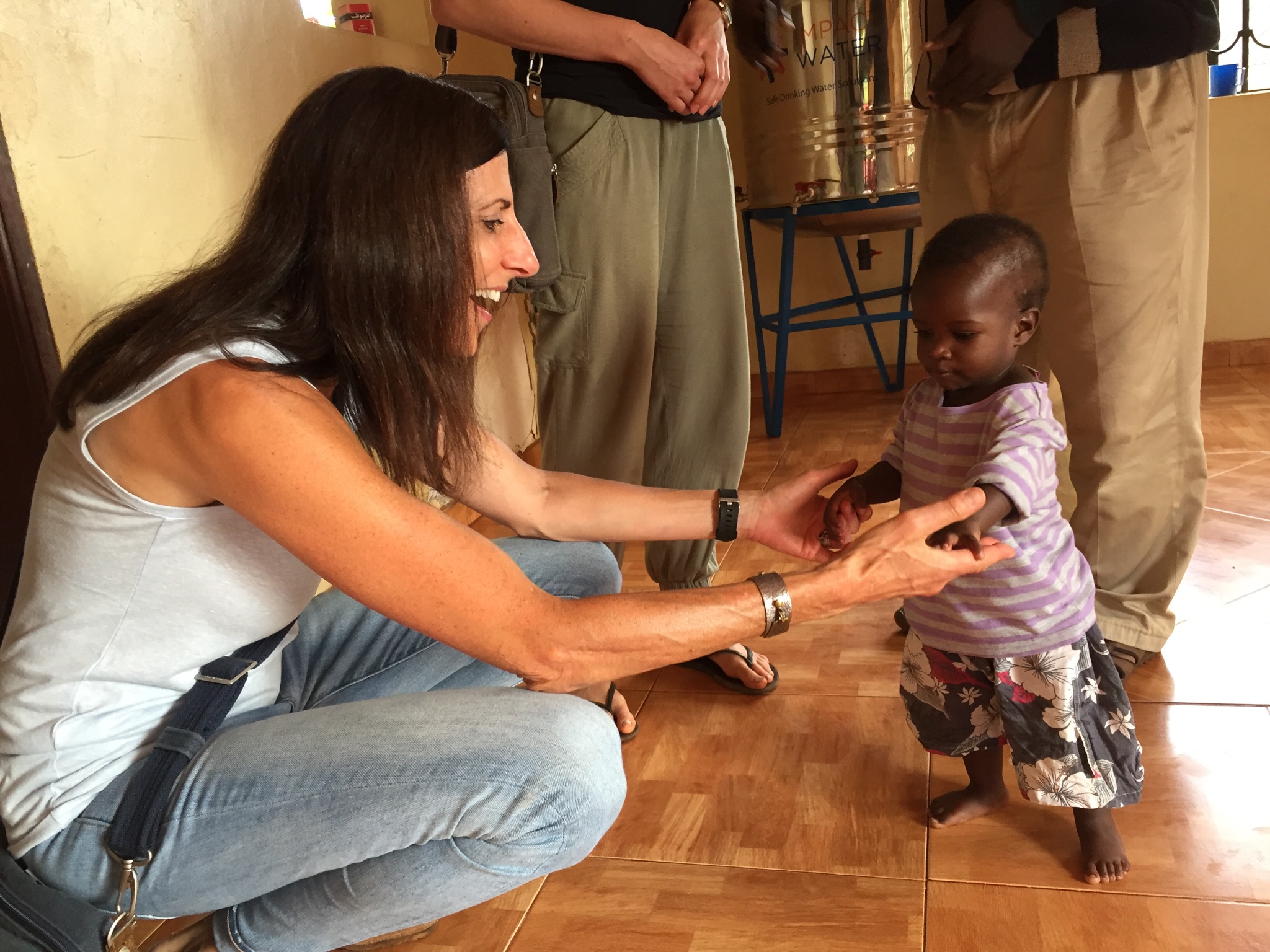Arrived last night around midnight. After a long wait at Entebbe Airport to get through customs and a harrowing and bumpy ride in the dark to Mutungo (no street lights or lights on the unfinished highway), I made it to the beautiful Lake Victoria Serena Hotel. After passing out around 1:30 am, I woke at 8 am to meet Samantha for breakfast. She walked the 20 minutes from her volunteer house and the plan was to walk back together with the medical supplies and take them to the clinic where she worked. It rained all morning, so we waited for the rain to stop, and then walked back. Since the roads are not paved, the walk back was muddy; orange mud that sucked your shoes in.
The road from the Serena to the volunteer house is interesting; there are food stands and businesses, from salons to hardware “stores” and pharmacies. They are rundown but busy. Because the volunteers often walked this road down to the hotel for the free Wi-Fi, they became familiar with the people along the road. Samantha developed a friendship with a young guy named Michael, who ran a food stand. He made 1 food item only, called a rolex, like the watch. He had a bucket filled with hot coals with a flat cooking surface on top. He made chapattis (round flat bread) and then he would fry 2-3 eggs and roll the eggs inside the chapatti with salted, sliced tomatoes. Samantha bought one every time she passed him and paid him double the price that he asked for. When we passed him that morning, we bought one for lunch and I could see how much he liked seeing her. She promised to come back and say goodbye to him, which we did later that night, taking a few great pictures. Samantha felt that she wanted to help him and gave him an envelope with 150,000 shillings, equivalent to $40. He was overwhelmed that she would do that for him and expressed his deep appreciation. It was very special to see this exchange; her generosity and his gratitude. I am deeply touched at my daughter’s kindness. Footnote: Michael texted Samantha that he purchased a new pressure cooker and other supplies for his business with her money. So awesome.
We made it back to the volunteer house after a muddy, uphill walk, passing small, rundown concrete houses, chickens and children along the way. The volunteer house sits behind a gate for security reasons. Samantha introduced me to Betty, Hilda, Martha and Carol, the kitchen staff. They cooked all meals for the volunteers and since the house was full with around 48 volunteers, the largest group they’ve ever had, this meant that they were cooking all day long. After breakfast, they started on lunch, and so on.
I met many of Samantha’s fellow volunteers: Emily, Kinzie, Reya, Mike, Wilson and Michelle, as well as the boys that do the work around the house – Felix and Michael. Everyone knew Samantha was leaving and it was clear they were sad to see her go!
We then headed over to the clinic with the medical supplies, some were donated and some we purchased. We took a boda boda (motorcycle) to get there; there are guys sitting on motorcycles on every street corner. We simply negotiated the rate and hopped on one; this is a main source of transportation for the volunteers. It’s cheap and fast; probably not safe, but when in Rome…
We arrived at the clinic and walked up a very steep hill with rough stairs cut into it. It was a 10 minute walk up the hill. Along the way we passed lots of children sitting outside ramshackle homes. The children all waved and ran over to us as we walked. Once we arrived at the top, the 2 Ugandan nurses that Samantha worked with, saw us and expressed their sadness at her leaving. Julie gave me a tour of each medical hut and explained what they do there, which is that they serve the very, very poor. They provide some HIV meds, but they never have enough and HIV is still a huge problem. They vaccinate children and adults for TB, help deliver babies, treat STD’s, treat TB and test for malaria and HIV. Prostitution is a big problem in the poorest areas, contributing to the prevalence of HIV. We saw 2 women in the labor and delivery hut waiting to give birth. There were 6 beds in the room, all with a green vinyl foam mattress. No sheets, no baby monitors, no equipment of any kind. These women were on their own. When their time came to deliver, a midwife would help with the delivery. There is so much to say about the state of health care in Uganda. We have eradicated HIV for the most part in the US, but in third world countries, people are still contracting HIV at alarming rates, and many babies are born HIV positive. The government helps a little, but not nearly enough. These amazing Ugandan nurses that we met are on the front lines every day, fighting for the lives of people with no voice and few options. It was heartbreaking to see how high the deck is stacked against them.
We said our goodbyes and headed back to the volunteer house on another boda boda. I was surprisingly relaxed about zipping along a Ugandan road on a motorcycle – it was actually fun! As luck would have it, David, her program manager and the director of the orphanage, was at the volunteer house at the same time we were. We told him that we wanted to see the orphanage that day, that we had clothing to drop off and money to spend on whatever he needed. He drove us back to the hotel to pick up the duffel of clothing, and then along with his 2-year-old adorable son Isaiah, we headed to a store to buy supplies. I told David what we had to work with; cash donations from my friends, and we filled 2 shopping carts with diapers, wipes, soap and toilet paper.
We drove through the most beautiful country to get to the orphanage. The roads we took overlooked the villages below, and the views were breathtaking. The neighborhood itself was rundown and poor, with the orphanage sitting behind a gate. We arrived at the orphanage around 5 pm and saw groups of young children playing outside. We delivered our donations, for which they were so grateful. David introduced us to the orphanage supervisor, who told us how the children come to them, and what their mission is. Many children are literally dumped in ditches or just left somewhere to die. All of the surrounding police stations contact the orphanage when they find an abandoned baby or child. The orphanage makes every attempt to locate the mother or a family member because they want to try and reunite babies with their mothers (mothers that can’t take care of them or don’t want them). If they stay, they are taken care of by the orphanage.
Women come in to help with the babies and teachers come to teach the older children; they have set up a school in one room of the orphanage. We saw around 8 infants, 8 babies around 1 year of age, and many older children. We arrived at dinnertime and bath time, so we had the joy of helping to hold and bathe the tiny babies. One of the newborns that was recently abandoned had cerebral palsy. We sat with the 1-year-olds and they crawled right over to us to be held. They were so precious and so innocent, but with such an uncertain future. However, they did seem content and happy; all of the older children seemed to be happy as well. The babies were responsive and laughing, the older children were playing. Our impression was that these children were not only receiving food and shelter, but love as well. David Kibalama and his wife are examples of what is good in the world. They are 2 ordinary people doing extraordinary things to save children’s lives, and give them the love and education they need to have a chance. We hated to leave. This experience touched both of us deeply and left us wondering what more we could do to help.
Off to Mt. Kilimanjaro tomorrow!
